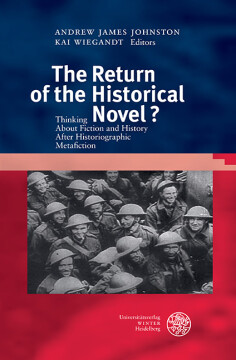
BUCH
The Return of the Historical Novel?
Thinking About Fiction and History After Historiographic Metafiction
Herausgeber: Johnston, Andrew James | Wiegandt, Kai
Britannica et Americana. 3. Folge, Bd. 33
2017
Zusätzliche Informationen
Bibliografische Daten
Abstract
Until recently, the critical reception of historical fiction was dominated by two theoretical paradigms: György Lukács’s Marxist view and Linda Hutcheon’s concept of ‘historiographic metafiction’. We are now entering a new phase as the discussion of the historical novel is rapidly becoming more inclusive, more tolerant and, above all, more diverse. It is before the backdrop of these changes in the critical debate that the contributions to this volume are meant to be read. Rather than seeing historical fiction as locked in a clear-cut scheme of teleological succession or assigning to the historical novel specific aesthetic purposes, the articles in this collection seek to probe deeply into the historical novelʼs potential for providing readers not simply with an understanding of how the image of the past is constructed but also of how attempts to chart forms of historical otherness constitute a specific mode of cultural experience mediated by literature. This desire for a literary experience of historical otherness has recently increased in urgency, even if the historical authenticity one might nostalgically associate with such a project must always elude us. Authors discussed include Walter Scott, John Fowles, Graham Swift, M. J. Vassanji, J. M. Coetzee, Peter Ackroyd, Alan Massie, Julian Barnes, Ian McEwan, Hilary Mantel and Jim Crace.
Inhaltsverzeichnis
| Zwischenüberschrift | Seite | Aktion | Preis |
|---|---|---|---|
| Cover | Cover | ||
| Titel | 3 | ||
| Imprint | 4 | ||
| Table of Contens | 5 | ||
| Acknowledgements | 7 | ||
| Andrew James Johnston, Kai Wiegandt: Introduction | 9 | ||
| Cordula Lemke: Scott-land and the Invention of the Historical Novel: alter Scott’s "Waverley" | 19 | ||
| Claudia Olk: Neo-Victorian Novels: Staging Historicity in John Fowles’s "The French Lieutenant’s Woman" | 31 | ||
| Ute Berns: Historiographic Metafiction and the History of Nature: John Fowles’s "The French Lieutenant’s Woman" and Graham Swift’s "Waterland" | 47 | ||
| Russell West-Pavlov: The Production of History: M. G. Vassanji’s Postcolonial Historical Novel on the Indian Ocean Rim | 73 | ||
| Kai Wiegandt: History as Struggle of Generations: J.M. Coetzee’s "The Master of Petersburg" | 87 | ||
| Helga Schwalm: Figurations of Authorship in Postmodern Historical Fiction | 105 | ||
| Heike Hartung: History, the Contemporary, and Life in Time: Timescapes in Ian McEwan’s and Julian Barnes’s Novels | 119 | ||
| Andrew James Johnston: "Atonement" – Ian McEwan's "Canterbury Tale"? | 145 | ||
| Renate Brosch: Thomas Cromwell, Our Contemporary: The Poetics of Subjective Experience as Intersubjective Ethics in "Wolf Hall" | 163 | ||
| Margitta Rouse: ‘There’ll just be progress of a sort’: Elegizing the Historical Novel in Jim Crace’s "Harvest" | 185 | ||
| Biographical Notes | 205 | ||
| Index | 207 |


 Publishing Platform by CloudPublish
Publishing Platform by CloudPublish